Kroger Vs Opioid Crisis Lawsuit
One of America’s largest supermarket chains, Kroger, has reached a settlement agreement totaling nearly $1.4 billion to resolve claims from states, counties, and Native American tribes regarding its alleged role in the opioid epidemic. The company, which operates stores across 35 states, is expected to begin payments in early 2024.
The settlement breakdown includes up to $1.2 billion for state and local governments where Kroger conducts business, $36 million for Native American tribes, and approximately $177 million to cover legal fees and expenses. This agreement, initially announced in autumn 2023, has garnered support from a coalition of 30 bipartisan attorneys general who have signed on behalf of their states.
A Kroger spokesperson stated, “The finalization of this settlement, initially reached in September 2023, will provide over $1.2 billion to support nationwide opioid abatement efforts while resolving nearly all outstanding opioid-related claims against the company.” However, the company maintains that the settlement does not constitute an admission of wrongdoing or liability.
Beyond financial compensation, Kroger has committed to implementing injunctive relief measures. These include enhanced monitoring, reporting, and data-sharing practices within their pharmacies to identify and report suspicious activities related to opioid prescriptions.
Legal representatives for the plaintiffs hailed the settlement as “another significant step in holding each company involved in the opioid epidemic accountable and ensuring essential resources are delivered to communities across the country.”
This settlement is part of a broader trend of legal actions against drug distributors, pharmacies, and wholesalers for their alleged contributions to the opioid crisis. Over the past eight years, communities have secured settlements exceeding $50 billion from various entities implicated in the epidemic.
Commentary by YourDailyFit columnist Alice Winters:

The Kroger settlement marks a pivotal moment in the ongoing battle against the opioid epidemic, highlighting the complex interplay between corporate responsibility, public health, and legal accountability. This agreement, while substantial, raises critical questions about the long-term impact of such settlements on both the affected communities and the pharmaceutical retail landscape.
Firstly, the $1.4 billion figure, while impressive, must be contextualized. For a company of Kroger’s size, with annual revenues exceeding $130 billion, this settlement, spread over time, may not significantly impact its bottom line. This raises concerns about the deterrent effect of such penalties on corporate behavior in the pharmaceutical sector.
The allocation of funds is another area deserving scrutiny. While the distribution to states, local governments, and Native American tribes is a step in the right direction, the effectiveness of these funds in addressing the opioid crisis will depend heavily on implementation strategies. Past settlements have shown that without proper oversight and targeted programs, such funds can be misallocated or underutilized.
Perhaps more intriguing is the injunctive relief component of the settlement. The agreement to enhance monitoring and reporting of suspicious opioid prescription activities is a positive development. However, it begs the question: why weren’t such practices standard procedure before? This reactive approach to pharmacy ethics underscores a systemic issue in the industry where profit motives have often overshadowed public health concerns.
Furthermore, the settlement’s structure, which resolves claims without admission of liability, is a double-edged sword. While it expedites the distribution of resources to affected communities, it also allows corporations to sidestep full accountability for their roles in the opioid crisis. This pattern, seen across multiple settlements in the industry, may hinder efforts to enact meaningful, long-term changes in corporate practices.
The broader implications for the pharmacy sector are significant. As major chains face similar lawsuits and settlements, we may see a shift in how pharmacies operate, particularly in their prescription drug practices. This could lead to more stringent internal controls, potentially affecting accessibility for patients with legitimate needs.
In conclusion, while the Kroger settlement represents a significant financial commitment to addressing the opioid crisis, its true value will be measured by the tangible improvements in affected communities and the long-term changes it spurs in corporate behavior. As we move forward, it is crucial to maintain a critical eye on how these funds are utilized and whether they truly serve to mitigate the devastating impacts of the opioid epidemic. The health product and supplement industry should view this as a cautionary tale, emphasizing the need for proactive ethical practices rather than reactive damage control.




